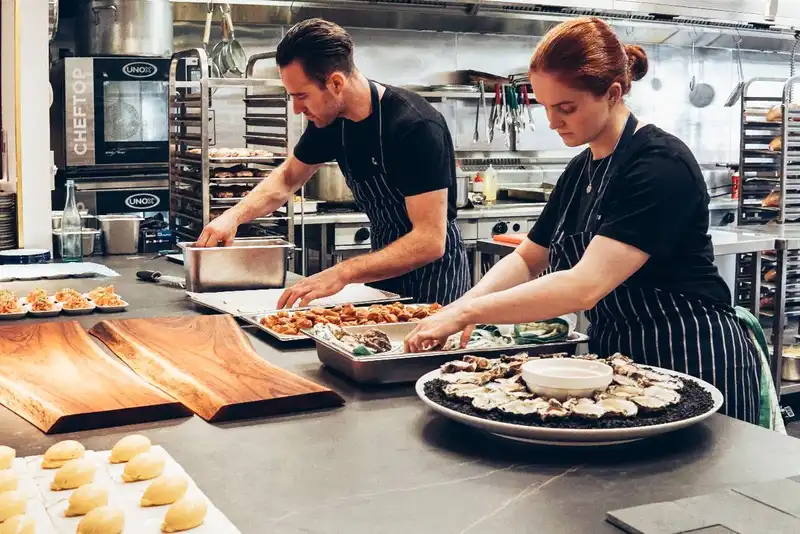What is a staffing agency?
A staffing agency is a business that connects employers with potential employees, providing temporary, part-time, or permanent workers to meet various job requirements and workforce needs across different industries.
How to Provide Staffing for Busy Restaurants
Importance of Staffing Agencies
The restaurant industry is a dynamic and ever-evolving sector, marked by its rapid adaptation to new trends, consumer preferences, and technological advancements. In recent years, this industry has witnessed significant changes, ranging from the rise of digital ordering systems and delivery services to the increasing emphasis on sustainable and locally sourced ingredients. These transformations are not just reshaping the dining experience but also redefining the skills and roles required within restaurant staffing.
As these trends continue to influence the industry, the need for specialized and adaptable staff becomes more pronounced. This is where staffing agencies play a crucial role. By providing a bridge between restaurant owners and potential employees, these agencies are instrumental in responding to the fluctuating demands of the industry. They not only offer a pool of qualified candidates but also ensure that these individuals are equipped with the necessary skills and knowledge to thrive in the modern restaurant environment.
The importance of staffing agencies in this landscape cannot be overstated. They are the linchpins that allow restaurant owners to efficiently manage their workforce needs, whether it's sourcing a talented chef who is adept in the latest culinary techniques or finding front-of-house staff who can seamlessly integrate technology into the customer service experience. In an industry where customer satisfaction is paramount and directly linked to the competence and quality of the staff, the role of these agencies becomes even more critical.
Moreover, the adaptability of staffing agencies to industry trends is a key factor in their effectiveness. As the restaurant industry continues to evolve, these agencies must stay abreast of the latest developments, ensuring that their staffing solutions are not just meeting the current needs of restaurant owners but are also forward-thinking. This foresight involves understanding emerging dining trends, anticipating future staffing requirements, and continuously updating their training and recruitment processes.
Understanding the Current Restaurant Industry Trends

The restaurant industry is continuously shaped by emerging trends that influence customer preferences and operational methodologies. Understanding these trends is crucial for restaurant owners and staffing agencies alike, as they directly impact the demands and expectations placed on restaurant staff.
One of the most significant trends in recent years is the adoption of technology. Restaurants are increasingly integrating digital solutions like online ordering systems, contactless payments, and AI-powered customer service. This technological integration demands staff who are not only tech-savvy but also adaptable to rapidly changing digital environments. Staff must be proficient in managing these systems, ensuring seamless customer experiences while maintaining operational efficiency.
Another trend reshaping the industry is the evolving customer preferences, particularly towards healthier, sustainable, and locally sourced food options. This shift has led to a growing need for chefs and kitchen staff who are knowledgeable in these areas and can innovate with menu offerings to meet these preferences. Furthermore, the increased awareness around dietary restrictions and allergies requires staff to be more informed and attentive to customer needs.
Operational shifts have also had a significant impact. With the rise of food delivery services and ghost kitchens, there's a growing demand for staff who can efficiently handle off-premise dining experiences. This includes managing delivery orders, packaging food appropriately, and ensuring food quality and safety during transit.
The rise of experiential dining is another trend that cannot be ignored. Customers are seeking unique dining experiences that go beyond just food. This requires staff who are not only service-oriented but also able to contribute to creating a memorable dining atmosphere, whether through knowledgeable interaction, storytelling, or personalized service.
Additionally, the emphasis on sustainability and eco-friendliness within the industry calls for staff who are conscious and knowledgeable about sustainable practices, from waste reduction to energy-efficient operations.
The current trends in the restaurant industry are significantly reshaping the requirements and expectations from restaurant staff. Staffing agencies and restaurant owners must acknowledge these trends and adapt accordingly. This means recruiting and training staff who are not only skilled in traditional roles but are also versatile, tech-savvy, and aligned with the evolving preferences and values of today's customers. By doing so, they can ensure that the restaurants they support are well-equipped to thrive in this dynamic and competitive industry.
The Role of Staffing Agencies in a Changing Industry
In the rapidly evolving landscape of the restaurant industry, staffing agencies play an increasingly critical role. Their function extends beyond merely filling positions; they are key partners in ensuring that restaurants are equipped with a workforce capable of adapting to and thriving in a changing environment. This pivotal role of staffing agencies is accentuated further as the industry faces new challenges and embraces novel trends.
At the heart of their role, staffing agencies act as a conduit between skilled professionals and restaurants. They shoulder the responsibility of not only identifying and recruiting talent but also ensuring that this talent aligns with the specific needs and culture of each restaurant. This requires a deep understanding of the restaurant industry's nuances, including culinary trends, customer service expectations, and operational shifts, such as the rise of digital technologies in restaurant management and customer engagement.
The need for agencies to stay informed about industry trends cannot be overstated. In a sector where trends can shift rapidlyfrom plant-based menus to digital-only kitchenshaving a pulse on these changes is crucial. This knowledge allows staffing agencies to provide relevant and timely staffing solutions. For instance, as restaurants increasingly adopt technology for order management and customer service, agencies need to supply staff who are not only tech-proficient but also quick to adapt to new digital tools.
Moreover, the trends towards sustainability, local sourcing, and artisanal food experiences require chefs and kitchen staff who are not just culinary experts but also innovators and artisans in their own right. Staffing agencies must, therefore, seek out individuals who possess these specialized skills and an understanding of these evolving culinary trends.
In addition to technical skills and knowledge, staffing agencies must also focus on soft skills such as adaptability, communication, and customer service. The modern dining experience is as much about the food as it is about the overall experience, which includes interaction with staff. Agencies must ensure that their candidates can contribute positively to the dining experience, reflecting the ethos and brand of the restaurants they serve.
Adapting Staffing Solutions to Technological Advances
The integration of technology in the restaurant industry has revolutionized how restaurants operate, from online ordering systems to digital Point of Sale (POS) systems. This technological advancement has not only streamlined operations but also created a demand for tech-savvy personnel who can navigate these new tools efficiently. Staffing agencies play a pivotal role in meeting this demand by adapting their staffing solutions to align with these technological changes.
Online ordering systems, for example, have become a staple in the industry, especially post-pandemic. These systems require staff who are not only adept at handling digital orders but also capable of managing customer interactions online. This includes ensuring order accuracy, handling customer queries, and maintaining a high level of service quality. Staffing agencies must therefore look for candidates with strong digital literacy and customer service skills.
Digital POS systems, another significant technological advancement, require staff who can manage transactions swiftly and accurately. The ability to troubleshoot minor technical issues and provide quick resolutions is also a valuable skill. Staffing agencies need to ensure that the staff they provide are trained in these systems, capable of handling high-volume transactions, and can adapt to different POS software.
Furthermore, the rise of data analytics in the restaurant industry calls for staff who can interpret data to improve business operations, such as modifying menus based on customer preferences or optimizing staffing schedules. Agencies should consider these skills when recruiting and training candidates.
To meet these evolving needs, staffing agencies must offer specialized training to existing staff and new recruits. This training should focus on the practical use of restaurant technology, troubleshooting common issues, and enhancing digital customer service skills. Additionally, agencies can collaborate with technology providers to stay updated on the latest advancements and incorporate this knowledge into their training programs.
In addition to technical training, it's crucial to foster a culture of continuous learning among staff. Encouraging staff to stay abreast of new technological trends and tools can make a significant difference in how quickly they adapt to changes in the workplace.
As technology continues to shape the restaurant industry, staffing agencies have a critical role in providing tech-savvy personnel. By focusing on recruiting individuals with strong digital skills and offering comprehensive training programs, these agencies can ensure that the staff they supply are not only competent in current technologies but also prepared for future advancements. This approach not only benefits the restaurants in terms of operational efficiency and customer satisfaction but also enhances the skill set and employability of the workforce within the industry.
Meeting the Demand for Specialized Skills

The restaurant industry is experiencing a growing demand for specialized skills, as diners increasingly seek unique and high-quality dining experiences. This trend has led to a heightened need for roles such as mixologists, sommeliers, gourmet chefs, and other culinary specialists. Staffing agencies play a crucial role in meeting this demand by focusing on specialized training and recruitment strategies to provide the right talent for these roles.
Mixologists, for instance, are no longer just bartenders; they are now seen as artisans of the beverage world. Their role involves more than just mixing drinks; it includes understanding flavor profiles, creating innovative cocktails, and presenting them in an engaging manner. Similarly, sommeliers are expected to have a deep knowledge of wines, pairings, and also the ability to educate and enhance the customer's dining experience.
Gourmet chefs, on the other hand, are required to have a repertoire that goes beyond traditional cooking. They need to be adept in various cuisines, knowledgeable about the latest culinary trends, and capable of creating dishes that are both visually appealing and delicious. These roles require not just technical skills but also creativity and a passion for the culinary arts.
Staffing agencies focusing on the restaurant industry must therefore adapt their recruitment and training strategies to cater to these specialized roles. This involves a more targeted approach in the recruitment process, where agencies seek out individuals with specific skill sets and backgrounds. Networking with culinary schools, participating in industry events, and connecting with professional groups can be effective ways to find talented candidates.
Additionally, providing specialized training is essential. This could include workshops on the latest mixology techniques, wine tasting sessions, or culinary classes focusing on new cooking trends and techniques. Such training not only helps in upskilling the workforce but also makes the candidates more attractive to high-end restaurants looking for specialized staff.
Furthermore, agencies need to understand the unique requirements of each restaurant they serve. Customizing their recruitment and training processes based on the specific needs of a restaurant ensures that the staff provided are well-aligned with the restaurant's concept and customer expectations.
Flexibility and Scalability in Staffing
The restaurant industry is characterized by its dynamic nature, often influenced by fluctuating customer footfalls and seasonal variations. This unpredictability necessitates a flexible and scalable approach to staffing, ensuring that restaurants can efficiently manage their workforce in alignment with their operational needs. Staffing agencies, therefore, play a pivotal role in providing solutions that cater to these varying staffing needs.
Flexibility in staffing is crucial for restaurants to maintain service quality during peak times and reduce overhead during slower periods. Agencies must offer a workforce that can be quickly mobilized or scaled down, depending on the restaurant's immediate requirements. This flexibility helps restaurants manage their labor costs effectively and maintain profitability, especially during unpredictable business cycles.
One strategy to maintain a flexible workforce is to have a pool of part-time or on-call staff who can be deployed as needed. This approach allows restaurants to have a core team for consistent operations, supplemented by additional staff during busier periods like weekends, holidays, or special events. Staffing agencies can maintain a roster of trained professionals ready to step in at short notice, ensuring that the quality of service remains uninterrupted.
Scalability in staffing solutions is equally important. Staffing agencies should have the capability to provide additional workforce during seasonal peaks, such as the summer months or festive seasons, when restaurants experience higher customer volumes. This scalability ensures that restaurants are not understaffed at critical times, which could impact service quality and customer satisfaction.
To achieve this, staffing agencies need to understand the patterns and trends of each restaurant they serve. Predictive analysis and effective communication with restaurant managers can help anticipate periods of high demand, allowing agencies to prepare and allocate resources accordingly. Furthermore, providing ongoing training and development ensures that all staff, whether part-time or full-time, are equipped with the skills needed to meet the high standards expected in the restaurant industry.
Prioritizing Health and Safety in Staffing Solutions
After the global pandemic, the emphasis on health and safety in the restaurant industry has intensified. This renewed focus extends beyond the traditional parameters of food safety and cleanliness to encompass a broader range of health and safety standards. Staffing agencies, playing a crucial role in this sector, must prioritize these aspects in their staffing solutions to meet the heightened expectations and ensure the well-being of both staff and customers.
The post-pandemic era has seen a significant shift in how restaurants operate, with health and safety becoming paramount. This shift necessitates a workforce that is not only skilled in their respective roles but also well-versed in the latest health and safety protocols. Staffing agencies are thus tasked with ensuring that their personnel are adequately trained and equipped to adhere to these stringent standards.
Training in food safety, for instance, has always been a critical component of restaurant operations. However, the scope of this training has expanded. It now includes rigorous practices in sanitation, proper handling and storage of food, and understanding the nuances of cross-contamination. Agencies must ensure that their staff, particularly those handling food, are certified in food safety and are regularly updated on the latest guidelines and best practices.
Moreover, the pandemic has brought to the forefront the need for training in personal hygiene, proper use of personal protective equipment (PPE), and understanding the protocols for illness reporting. Staffing agencies should incorporate these elements into their training programs, making them a mandatory part of the preparation for any restaurant role. Regular health and safety workshops, online training modules, and assessments can be effective ways to keep the staff updated and compliant.
Additionally, agencies need to foster a culture of safety among their staff. This involves encouraging staff to be vigilant about health and safety standards, not just as a matter of compliance but as a part of their responsibility towards customers and colleagues. Encouraging open communication about safety concerns and providing regular updates on health guidelines can reinforce this culture.
Key Takeaways
The role of staffing agencies in the evolving restaurant industry is multifaceted and critical. As highlighted throughout the article, these agencies are instrumental in adapting staffing solutions to meet the rapidly changing needs of the sector, driven by technological advancements, customer preferences, and the imperative for specialized skills.
The advent of technology in the restaurant industry, with the proliferation of online ordering systems and digital POS systems, has created a demand for tech-savvy staff. Staffing agencies must respond by providing personnel adept in these technologies and offering training to ensure proficiency in digital tools, enhancing operational efficiency and customer service.
The growing need for specialized skills such as mixologists, sommeliers, or gourmet chefs reflects a shift towards more sophisticated dining experiences. Agencies must focus on targeted recruitment and specialized training to meet these requirements, ensuring that the staff they provide can contribute significantly to the culinary and service quality of restaurants.
Flexibility and scalability in staffing are crucial in an industry characterized by fluctuating customer footfalls and seasonal demands. Staffing agencies must offer on demand staffing solutions that can be scaled up or down as required, maintaining a balance between operational efficiency and service quality.
The increased focus on health and safety standards, especially post-pandemic, underscores the need for rigorous training in food safety and hygiene protocols. Agencies play a key role in ensuring their staff are well-versed in these standards, contributing to a safe and healthy dining environment.
In essence, staffing agencies are not just facilitators of workforce solutions; they are strategic partners in the restaurant industry's growth and adaptation. By staying attuned to the latest industry trends, providing specialized and flexible staffing solutions, and prioritizing health and safety training, these agencies ensure that restaurants are equipped to meet the challenges of a dynamic market. Their ability to provide skilled, adaptable, and compliant staff is essential in enabling restaurants to offer high-quality dining experiences, maintain operational efficiency, and navigate the complexities of an ever-evolving industry.












